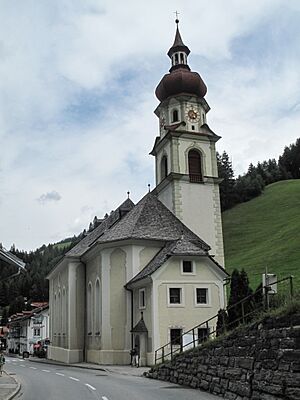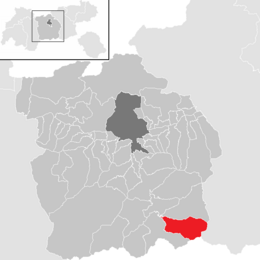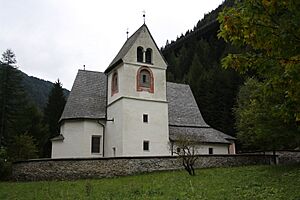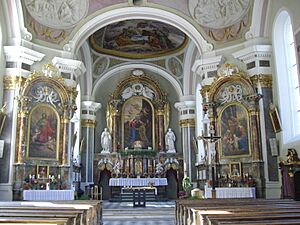Gries am Brenner facts for kids
Quick facts for kids
Gries am Brenner
|
||
|---|---|---|
 |
||
|
||

Location in the district
|
||
| Country | Austria | |
| State | Tyrol | |
| District | Innsbruck Land | |
| Area | ||
| • Total | 55.58 km2 (21.46 sq mi) | |
| Elevation | 1,165 m (3,822 ft) | |
| Time zone | UTC+1 (CET) | |
| • Summer (DST) | UTC+2 (CEST) | |
| Postal code |
6156
|
|
| Area code | 05274 | |
| Vehicle registration | IL | |
| Website | www.griesambrenner. tirol.gv.at |
|
Gries am Brenner, often called just Gries, is a small town in Austria. It is located in the Wipptal valley, which is in the southern part of the Innsbruck-Land District. The town is made up of several smaller villages or "hamlets."
Contents
Geography of Gries am Brenner
Gries am Brenner is found at the start of the Obernbergtal valley. It sits on the western side of the wider Wipptal valley. This wider part of the valley has enough space for the town, the Sill River, and the B182 road. The Brenner Railway runs on the eastern side, and the A13 motorway is on the western side, both at a higher level.
The beautiful Brennersee lake is also located within the area of Gries am Brenner.
History of Gries am Brenner
Early History and Important Passageway
Gries was a very important stop during the Roman Empire for people traveling south. However, the main town we see today began to form in the late Middle Ages. The very first settlements in the area were even older, dating back to before Roman times, in places like Nößlach and Vinader.
The road through Gries was used by traders, travelers, and even pilgrims. Many famous people passed through Gries am Brenner over the centuries. These included Charlemagne, a powerful emperor; Albrecht Dürer, a famous artist; Goethe, a well-known writer; and Mozart, a brilliant composer.
Fortresses and Customs
To keep the road safe, a fortress was built in Gries. But in 1241, there was a disagreement between Albert III of County of Tyrol and the Diocese of Brixen, which led to the fortress being torn down. Later, in 1287, Meinhard, Duke of Carinthia built another fortress at Leug, just south of Gries. This fortress was used for "customs duty," which means collecting taxes on goods passing through.
Mining and Changes Over Time
Frederick IV, Duke of Austria built a small church nearby, which had its own priest from 1461 to 1811. Maximilian I, Holy Roman Emperor often visited Gries because the area was full of wild animals for hunting. He would stay at the "Weißes Rößle" Inn during his trips.
Until about 1560, Gries benefited from the rich mines in the nearby Obernbergtal. The town had warehouses and workshops for making silver products. In 1809, during the Tyrolean Rebellion, a general named Lefebvre destroyed the customs station at Leug. It was permanently closed in 1815. After World War II, a coal mine was used for a few years at Nößlachjoch.
When the Brenner motorway was finished, most of the traffic started using the new highway. This made the village much quieter and less busy with tourists. Because Gries is close to the border, it still has several old hotels that have been there for hundreds of years.
Coat of Arms
The coat of arms for Gries am Brenner shows three black forts on a yellow background. These forts represent the old fortresses of Leug, Schlossögg, and Morhäusl. This special emblem was chosen on January 9, 1973.
Population of Gries am Brenner
| Historical population | ||
|---|---|---|
| Year | Pop. | ±% |
| 1869 | 875 | — |
| 1880 | 830 | −5.1% |
| 1890 | 753 | −9.3% |
| 1900 | 855 | +13.5% |
| 1910 | 890 | +4.1% |
| 1923 | 980 | +10.1% |
| 1934 | 1,001 | +2.1% |
| 1939 | 1,098 | +9.7% |
| 1951 | 1,257 | +14.5% |
| 1961 | 1,267 | +0.8% |
| 1971 | 1,445 | +14.0% |
| 1981 | 1,321 | −8.6% |
| 1991 | 1,330 | +0.7% |
| 2001 | 1,260 | −5.3% |
| 2011 | 1,255 | −0.4% |
| 2015 | 1,336 | +6.5% |
The number of people living in Gries am Brenner has changed over many years. The population has gone up and down, but it has generally stayed around 1,200 to 1,400 people.
Sights to See in Gries am Brenner
Religious Buildings to Visit
Church of the "Visitation of Mary"
Records show that a church existed in Gries as early as 1531. A new church was built in 1634 near the "am Gries" Inn. It was made bigger in 1676. In 1793, it finally had its own priest. Construction of the current church began in 1823 and was finished in 1828. It was built in the beautiful Baroque style, which was very popular in Tyrol at the time.
Church of “St. Leonard"
The church of “St. Leonard” is located in Vinader. It was likely built before the year 1000, but it was first officially mentioned in 1337. The church was made larger and updated in the Gothic style in 1489. In 1550, Vinader became a "Vicariate," meaning it was in charge of churches in the Sill Valley from Stafflach to Brennersee, including Obernbergtal. In 1802, the church was changed to the Baroque style, but its original Gothic entrance and bell tower were kept.
Church of "St. Jacob"
The church of "St. Jacob" is found in the village of Nößlach. It was first mentioned in a letter from 1426. In 1494, the church was renovated, and a new altar was built, which is still used today. A major renovation happened again in 1661.
Church of the "Saints Christopher and Sigismund"
Frederick IV, Duke of Austria, built a small Gothic church at Leug, close to the old customs station. It has a wide, strong bell tower that looks like it's from the Romanesque period. In 1684, the church was restored. A front entrance (vestibule) was added, and the inside was changed to the Baroque style.
Economy and Tourism in Gries am Brenner
Fun Things to Do: Tourism
Gries am Brenner is a great place for both winter and summer holidays. In winter, you can go skiing at the Sattelbergalm, which is a well-known ski resort. It's located at 2115 meters (about 6,939 feet) high, near the border. In summer, the Sattelbergalm is a wonderful spot for hiking and exploring the mountains.
See also
 In Spanish: Gries am Brenner para niños
In Spanish: Gries am Brenner para niños
 | Emma Amos |
 | Edward Mitchell Bannister |
 | Larry D. Alexander |
 | Ernie Barnes |





